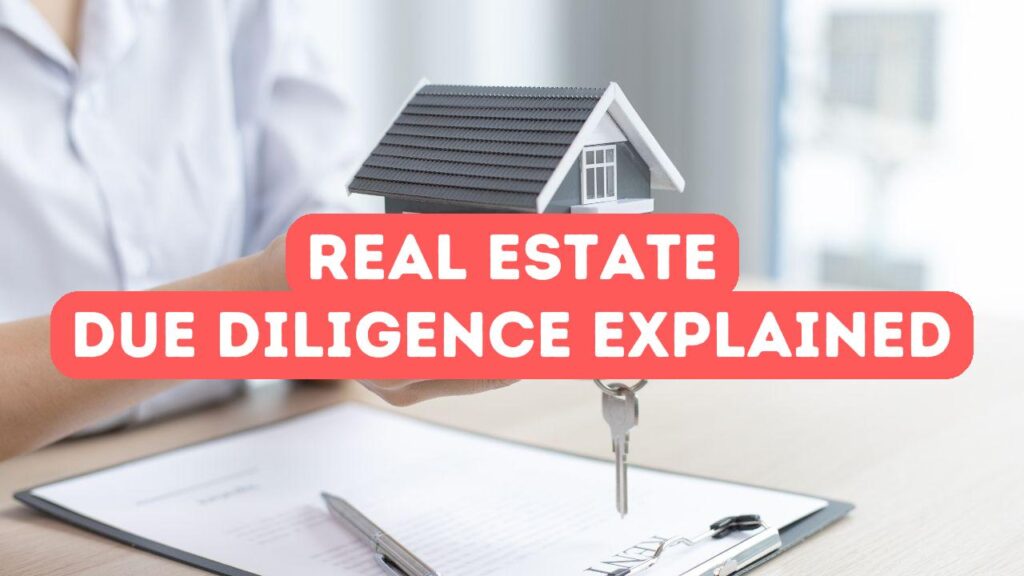Navigating the maze of property transactions can feel like walking a tightrope without a safety net. Real estate due diligence acts as your balancing pole, providing stability in a tumultuous market. It’s more than just paperwork; it’s your safeguard against unforeseen pitfalls. Not knowing the essentials of the due diligence process could cost you dearly, both in time and money. Equip yourself with a robust real estate checklist to ensure you leave no stone unturned. Whether you’re a seasoned investor or a first-time buyer, understanding these critical steps is vital. Property investment tips often emphasize thorough research for a reason—mistakes can have far-reaching consequences. By mastering effective real estate research tips, you’re not just buying property; you’re making an informed decision. Begin this journey with confidence, ensuring that your financial safety and peace of mind are the utmost priority in every transaction.
Understanding the Key Components of Real Estate Due Diligence
When embarking on property investment, one must embrace the diligence involved as a meticulous detective work. First thing’s first—grab your Real Estate Checklist. This roadmap is your compass in navigating the Due Diligence Process. Begin by inspecting the property itself, seeking potential red flags. Do walls hide water damage? Is the foundation solid? Next, scrutinize the legal aspects. Comb through titles and contracts, ensuring no lurking liabilities that could rear their ugly heads later. Don’t overlook environmental considerations; a once-overlooked toxin could haunt your transaction like a pesky poltergeist. Financial evaluations are vital too. Analyze the numbers with precision, as math is your ally here. Employ Real Estate Research Tips to dive deeper than surface impressions. Each component of real estate due diligence has its role, like players on a team, united in one purpose: securing a sound investment.
Certainly, let’s dive deeper into the heart of Real Estate Due Diligence. Picture this: you’re inspecting a diamond—examining facets that reflect the property’s potential. Begin with a comprehensive Real Estate Checklist to systematically tick off each necessary element. Your Due Diligence Process should cover an exhaustive examination of zoning regulations and compliance with local laws. It’s like stitching a quilt; every detail matters. Engaging local experts who know the lay of the land can provide Property Investment Tips to steer you clear of potential landmines. They help unveil aspects that might otherwise float beneath your radar. And while a property might seem idyllic on the surface, Real Estate Research Tips equip you to dig deeper—evaluating market trends and neighborhood dynamics. After all, the more information you wield, the better your chances at crafting a rock-solid investment. It’s about securing not just land, but peace of mind.
Tread carefully through the maze of inspections; it’s akin to assembling a puzzle where each piece is a different facet of Real Estate Due Diligence. Dive into property tax records to reveal potential hidden costs that might be lurking beneath the surface. Embrace the Due Diligence Process as you probe utility connections and explore maintenance histories, driving your understanding deeper. Your Real Estate Checklist isn’t just a guide—it’s a shield against costly mistakes. Enlist local authorities and utilize their insights as invaluable Property Investment Tips. Uncover the history of renovations, understanding how past changes could impact future dealings. With robust Real Estate Research Tips, you unravel the property’s story, ensuring it aligns with your investment goals. Remember, every step taken with diligence is like securing another knot in your safety net, fortifying your venture from unforeseen pitfalls.
Common Pitfalls to Avoid in Property Evaluations
In the labyrinth of property evaluations, it’s easy to stumble into common pitfalls if you’re not prepared. Real Estate Due Diligence is your shield, ensuring that each stone is carefully examined. One frequent misstep is neglecting a comprehensive Real Estate Checklist, which should be your guiding light through the Due Diligence Process. Investors often skip the step of verifying property boundaries, which can lead to costly legal battles down the road. Another trap is overlooking zoning restrictions—these hiccups can halt your development dreams in their tracks. Arm yourself with Property Investment Tips to dodge such blunders. A cardinal rule of Real Estate Research Tips is to never underestimate neighborhood evaluations. Ignoring this can result in unforeseen challenges that might affect property value. Remember, due diligence isn’t just a box to tick; it’s your blueprint for success in property investment. Avoid these hazards, and your investment will stand on firmer ground.
Unfamiliarity with the Due Diligence Process is yet another common stumbling block in real estate evaluations. This oversight can catch you off guard, much like an unseen obstacle on a winding path. A well-crafted Real Estate Checklist is your ally here, highlighting critical evaluations you might miss otherwise. For instance, reviewing past property tax assessments can reveal hidden financial burdens. Disregarding environmental factors is another pitfall; they can dramatically influence property suitability. Equip yourself with Property Investment Tips that emphasize the significance of environmental checks. Leverage Real Estate Research Tips to scrutinize local market trends, offering insights into future property value. Overstepping these essential tasks is akin to flying blind in turbulent skies. Real Estate Due Diligence isn’t just a task; it’s your compass in the storm, guiding you safely toward profitable investments. With careful preparation, you’ll navigate the property landscape with confidence.
Overlooking the importance of proper communication in the Due Diligence Process can lead to misunderstandings and missed opportunities. Clear coordination among all parties—agents, attorneys, and inspectors—is crucial. Real Estate Due Diligence thrives on transparency. Without it, even a thorough Real Estate Checklist might falter. Miscommunication is like building a bridge on shaky foundations; one misstep and the whole structure can crumble. Heed Property Investment Tips that underscore the need for effective dialogue. Another frequent oversight is ignoring the property’s financial history, such as undisclosed liens, which can be a massive roadblock. Utilize Real Estate Research Tips to dig deep into financial obligations before signing on the dotted line. Remember, real estate isn’t merely about the brick and mortar; it’s about strategically managing information. Navigate these waters with caution, and let your investment story be one of success and growth, unmarred by unnecessary mishaps.
Strategies for Effective Due Diligence in Real Estate Transactions
Executing thorough real estate due diligence is like putting on a detective’s hat—every clue must be unraveled. The first step in this process is creating a comprehensive real estate checklist. This list acts as your roadmap, guiding every move you make. From inspecting the property condition to evaluating legal documents, each task holds its own significance. Don’t underestimate the power of research. Dive into property investment tips that highlight potential red flags you should be aware of. The due diligence process demands attention to detail: verify all zoning laws, environmental issues, and financial statistics with precision. Use real estate research tips to cross-reference market trends and property history. Remember, knowledge is your strongest ally in this field. As you delve deeper into your investment journey, these strategies not only prevent costly errors but also lead you to prosperous opportunities.
To succeed in real estate due diligence, you need both keen insight and a reliable real estate checklist. Start by focusing on the property’s financial health—think of it as its lifeline. Examine mortgage obligations and tax assessments. Dive deep into utility bills and maintenance costs. Each of these details is a thread in the fabric of your decision-making process. Don’t forget the Due Diligence Process involves assessing the neighborhood and comparing property values. Real estate research tips suggest analyzing market shifts; are prices dipping or soaring? Property Investment Tips aim to arm you with foresight. Talk to local agents or other investors—they’re fountains of knowledge. Understanding the lay of the land, quite literally, can uncover parking issues or future construction plans. Each piece of information you gather acts like a beacon, guiding your investments safely through the dense fog of uncertainty.
Real estate due diligence isn’t just a task—it’s a safety net woven with informed decisions and strategic steps. Start by scrutinizing leases and contracts. These documents influence your long-term plans. Dive into the Due Diligence Process; examine potential challenges like liens or encroachments on your Real Estate Checklist. Keen eyes on these details save you from future woes. Employ Property Investment Tips to amplify your insights, especially when estimating renovation costs – foresight is invaluable. Nowadays, Real Estate Research Tips are indispensable in analyzing demographic trends around your property. Are businesses flocking to the area, or is it witnessing a slow decline? Each discovery adds another tool to your decision-making toolkit. Remember, real estate due diligence is a marathon, not a sprint—take each step with caution, armed with knowledge, ensuring your investment journey is not only insightful but successful.







